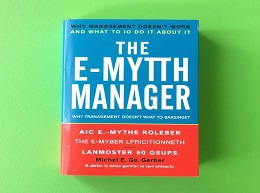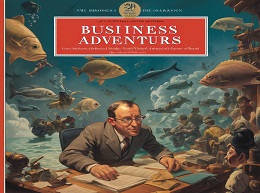The E-Myth Manager: Why Management Doesn't Work - and What to Do About It

The E-Myth Manager: Why Management Doesn't Work - and What to Do About It
Michael E. Gerber's "The E-Myth Manager: Why Management Doesn't Work - and What to Do About It" offers a compelling critique of traditional management practices and provides a transformative approach to leadership. Gerber, known for his best-selling "The E-Myth Revisited," continues his exploration of entrepreneurial myths, this time focusing on the managerial realm. This review delves into the core themes of the book, highlights key insights, and provides practical examples to engage readers.
The E-Myth Explained
Gerber introduces the concept of the "E-Myth" (Entrepreneurial Myth) which is the mistaken belief that most small businesses are started by entrepreneurs risking capital to make a profit. In reality, most are started by "technicians" who are skilled at what they do but lack the knowledge of how to manage a business.
Example: The Technician-Turned-Manager
Consider a talented software developer who decides to start her own company. She excels in coding but struggles with managing her team, handling finances, and marketing her product. Gerber argues that many managers fall into this trap, believing their technical skills alone can lead a business to success.
The Managerial Mindset
Gerber challenges the traditional managerial mindset, which often relies on hierarchical structures and rigid processes. He argues that this approach stifles innovation, demotivates employees, and ultimately leads to organizational failure.
Example: The Bureaucratic Company
Imagine a company where every decision has to go through multiple layers of approval. This bureaucratic approach can slow down operations, frustrate employees, and prevent the company from adapting quickly to market changes.
Shifting Perspectives
Gerber advocates for a shift from the traditional managerial mindset to an entrepreneurial one. This involves viewing management as a dynamic and creative process rather than a static set of rules.
Example: The Agile Manager
An agile manager encourages team members to take ownership of their projects, fosters a culture of continuous improvement, and adapts quickly to changes. This approach can lead to higher employee satisfaction and better business outcomes.
Systems Thinking
A core theme in "The E-Myth Manager" is the importance of systems thinking. Gerber emphasizes that successful management involves creating and refining systems that can operate independently of the individuals who implement them.
Example: The Franchise Prototype
Gerber often uses the analogy of a franchise, where each outlet operates according to a proven system. By developing and documenting processes, managers can ensure consistency and efficiency across the organization.
Developing a Vision
Gerber stresses the importance of having a clear vision for the organization. This vision should guide every decision and action, providing a sense of purpose and direction.
Example: Vision-Driven Leadership
A manager at a non-profit organization might develop a vision of eradicating homelessness in their city. This vision would inform their fundraising strategies, program development, and community partnerships, ensuring that all efforts are aligned with the ultimate goal.
Empowering Employees
Traditional management often involves controlling employees' actions, but Gerber advocates for empowering them instead. This means providing the tools, resources, and autonomy they need to succeed.
Example: The Empowered Team
At a tech start-up, a manager might give their team the freedom to choose their projects and decide how to allocate their time. By empowering employees, the manager fosters a sense of ownership and accountability, leading to higher motivation and productivity.
Continuous Improvement
Gerber emphasizes the need for continuous improvement in all aspects of the business. This involves regularly reviewing and refining processes to ensure they remain effective and efficient.
Example: The Kaizen Approach
Inspired by the Japanese concept of Kaizen, a manager might implement regular team meetings to discuss what’s working and what’s not. By continuously seeking ways to improve, the team can stay ahead of challenges and adapt to changes more effectively.
Case Study: A Retail Business
Consider a retail business struggling with high employee turnover and inconsistent customer service. By applying Gerber's principles, the manager can transform the business:
1. Develop a Vision : Establish a vision of providing the best customer service in the industry.
2. Create Systems : Develop training programs and standard operating procedures for all employees.
3. Empower Employees : Give employees the authority to resolve customer complaints on the spot.
4. Continuous Improvement : Regularly gather feedback from customers and employees to refine processes.
This approach can lead to a more motivated workforce, better customer experiences, and ultimately, increased profitability.
Case Study: A Software Company
A software company facing project delays and quality issues can also benefit from Gerber's insights:
1. Develop a Vision : Set a vision of delivering innovative and reliable software solutions.
2. Create Systems : Implement agile methodologies to streamline development processes.
3. Empower Employees : Encourage developers to take ownership of their projects and suggest improvements.
4. Continuous Improvement : Hold regular retrospectives to identify and address bottlenecks.
By adopting this entrepreneurial approach, the company can enhance productivity, improve product quality, and accelerate time-to-market.
The Growth Mindset
Gerber's philosophy aligns with the concept of a growth mindset, which involves believing that abilities can be developed through dedication and hard work. This mindset is crucial for both managers and employees in creating a culture of innovation and resilience.
Example: The Learning Organization
A manager who encourages continuous learning and development fosters a growth mindset within the team. This can lead to increased creativity, better problem-solving, and a more adaptive organization.
The Importance of Adaptability
In today’s rapidly changing business environment, adaptability is key to long-term success. Gerber’s emphasis on systems and continuous improvement prepares organizations to respond effectively to new challenges and opportunities.
Example: The Resilient Company
A company that regularly reviews its processes and adapts to market trends is more likely to survive and thrive in the face of disruptions. This adaptability can provide a significant competitive advantage.
Redefining Management
"The E-Myth Manager: Why Management Doesn't Work - and What to Do About It" offers a revolutionary approach to management that emphasizes vision, empowerment, systems thinking, and continuous improvement. By adopting Gerber’s principles, managers can move beyond outdated practices and create dynamic, innovative, and successful organizations.













